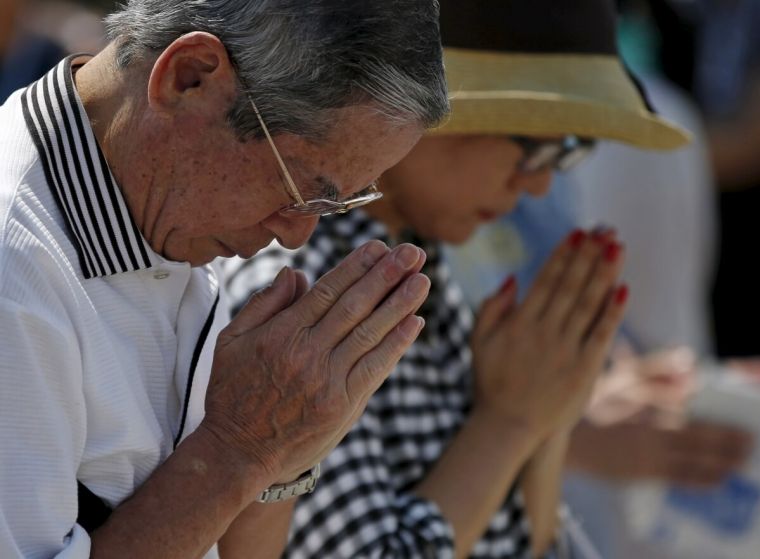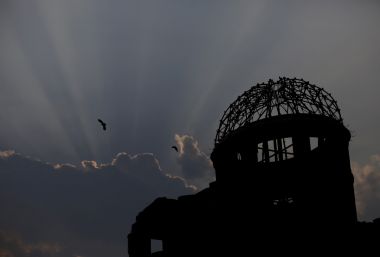Is it time to apologise for Hiroshima?

On August 6 1945 a single B-29 bomber slipped through Japanese anti-aircraft defences. Some say the gunners were told not to waste their ammunition on single planes which would be difficult to hit and likely to be doing reconnaissance. This was not reconnaissance mission, this bomber was headed towards a major city in western Japan. At 8.15 on that warm, clear morning residents described seeing two intense flashes of light. One of those that survived the "Little Boy" atomic device's detonation was Akihiro Takahashi. He was 15 years old when the bomb was dropped, he and his classmates were lining up in their playground ready for registration:
"Everything collapsed for as far as I could see. I felt the city of Hiroshima had disappeared all of a sudden. Then I looked at myself and found my clothes had turned into rags due to the heat. I was probably burned at the back of the head, on my back, on both arms and both legs. My skin was peeling and hanging."
Official Japanese figures at the time stated that 118,661 civilians were killed. But according to BBC estimates the final toll, including those that died later from radiation exposure, is closer to 140,000. Many others suffered long-term sickness and injury from the bomb. The first atomic bomb to be used in anger delivered the equivalent of 15,000 tonnes of TNT explosives and obliterated an area of five square miles. Just three days later another bomb was dropped on Nagasaki, where another 74,000 people died.
70 years on from the Enola Gay's mission is it time for the allies to apologise for the devastation? Here are five arguments used to defend the dropping of the H-bomb:
1. Ending the war early saved lives
One argument is that there were no indication of Japanese surrender and so the atomic bombs dropped on Hiroshima and Nagasaki hastened the end of the war, saving both allied soldiers lives as well as Japanese citizens. There is some evidence for this argument from the tooth and nail fighting at Iwo Jima where 6,800 US and nearly 18,000 Japanese combatants lost their lives. If that many could be killed in a small, sparsely populated island, imagine how many could be killed on the streets of Japan once a ground war started. So the argument is that this tactical atomic strike saved lives.
There is an insane logic to this. The merciless mathematics of calculating how many enemy civilian deaths are acceptable to save the lives of allied service personnel is a monstrous moral conundrum. But, some things are wrong to do no matter how many lives they may ultimately save. Sometimes the ends do not justify the means. The deliberate targeting of two major civilian metropolitan areas and dropping kilotons of nuclear rage instantly killing more than 200,000 people is unacceptable.
2. The Japanese were committing unspeakable crimes

Some would argue that the abuse and murder of prisoners of war by the Japanese justified the atomic attack. The mass killings of civilians means the Japanese deserved the atomic bombs. But two wrongs have never made a right. If Japan can be painted as an unrelentingly evil nation then it makes our treatment of them in the war easier to swallow. But history tends to belong to the victors as they have the opportunity to spin the historical situation in a way that exalts the winner.
In so many movies about the Second World War from Bridge over the River Kwai to last year's Unbroken we are given a one dimensional evil picture of the Japanese. There is no denying that horrific crimes were committed. According to some estimates the Japanese captured 140,000 allied military personnel and around 30,000 prisoners of war died from disease and mistreatment. These are clearly wrong. But it does seem that terrible things were being committed by both sides.
Even before the Atomic bombs were dropped the allied forces deliberately targeted Japanese cities for massive civilian deaths. Bombing raids took place at night as the planes were sitting targets in daylight. Bombs were dropped from 10,000 feet which meant accurate targeting was impossible. So the allied forces were simply aiming at the biggest targets they could find and so came the strategy to wipe out Japanese cities. This was achieved by deliberately trying to create fire storms which would rip through Japanese houses (predominantly made from paper and wood). According to US military analysts, the casualties from bombing Japanese cities is in the region of 126,000 people.
During the war Robert McNamara worked for Major General Curtis LeMay analysing the efficiency of US bombers. LeMay was in charge of the strategic bombing of Japan. Later in his life, after serving as Secretary for Defence in JF Kennedy's administration. McNamara made the following admission in a documentary called the Fog of War:
"LeMay said, 'If we'd lost the war, we'd all have been prosecuted as war criminals.' And I think he's right. He, and I'd say I, were behaving as war criminals. LeMay recognized that what he was doing would be thought immoral if his side had lost. But what makes it immoral if you lose and not immoral if you win?"
All this to say that the dropping of the atomic bomb as punishment on the Japanese seems hypocritical.
3. The Japanese started it - they bombed Pearl Harbor
The surprise attack on the American fleet stationed in Pearl Harbor was not completely unprovoked. The US had enforced a trade ban on Japan's export of oil and steel, in other words there were already some hostilities between the two nations.This is not to justify the Japanese bombing but providing a context. Pearl Harbor was the biggest home soil military defeat America has ever received. It remains a huge embarrassment that the US Navy was so unprepared for the attack. As a young boy The Dam Busters was one of my favourite movies. I never tired of seeing the incredible application of science in blowing up a damn by skimming a bomb across the water. Those unsuspecting Nazis could never guess what was going to happen to them. Those families asleep in their beds had no chance as millions of cubic litres of water swept away their houses in a man-made Tsunami. We celebrate the ingenuity of the Dam Busters' surprise attack but we condemn the bombing of Pearl Harbor because history belongs to the victors. Some see the ongoing sense of embarrassment and a need for vengeance as the primary motive for the dropping of the H bomb. Sadly the memory of Pearl Harbor has an ongoing point of tension between the US and Japan as evidenced by some of the tweets around the women's world cup final.
Hey Japan, that one was for Pearl Harbor. U-S-A, U-S-A, U-S-A.
— Cloyd Rivers (@CloydRivers) July 6, 20154. All is fair in love and war
The idea that morality is not important when it comes to warfare is interesting. War is evil, so are the tactics and practice of war, so there is no point trying to apply peacetime ethics. But interestingly (and I believe entirely correctly) this was not the approach that the allies took to the war crimes of the Nazis, especially when it relates to the killing of 6 million Jews. There are rules of engagement and there are some things that are inexcusable, regardless of context and circumstances. It was entirely appropriate for the Nazis to be held to account for the Holocaust. It was not acceptable to plead that all is fair in love and war in that circumstance. Even in the middle of the horrors of war there are still ethical lines that need to be upheld.
5. We weren't there so who are we to judge?
This argument has some validity. With the luxury of peace and the benefit of 20:20 hindsight it is all too easy to judge those that made impossible decisions in the middle of crisis. But there were voices of dissent at the time who were challenging the ethics of the strategic bombing campaigns; let alone the atomic bombs. One voice was Bishop Bell of Chichester who gave a compelling speech to the British House of Lords. For me the bishop offers a wonderful model of how Christians should be engaging in the public life of a nation. Bell doesn't speak up for his own personal interests or the interests of Christians. He speaks up for his enemy. He doesn't try to bully his views through, he offers a compassionate, forthright and clearly argued case.
You can read his whole speech here, but here is a taster:
"I would humbly claim to be one of the most convinced and consistent Anti-Nazis in Great Britain. But I desire to challenge the Government on the policy which directs the bombing of enemy towns on the present scale, especially with reference to civilians, non-combatants, and non-military and non-industrial objectives. I also desire to make it plain that, in anything I say on this issue of policy, no criticism is intended of the pilots, the gunners, and the air crews who, in circumstances of tremendous danger, with supreme courage and skill, carry out the simple duty of obeying their superiors' orders."
In light of the flimsy nature of the arguments to justify the targeting of civilians with both strategic and atomic bombing leading to wholly unacceptable numbers of civilian deaths. I believe that 70 years on from bombing of Hiroshima an apologys from the allies is the least that we can do. And if our leaders are not able to give it; perhaps it would be a start if we said sorry too.
Krish Kandiah is President of London School of Theology, CEO of Home for Good and Contributing Editor for Christian Today.











